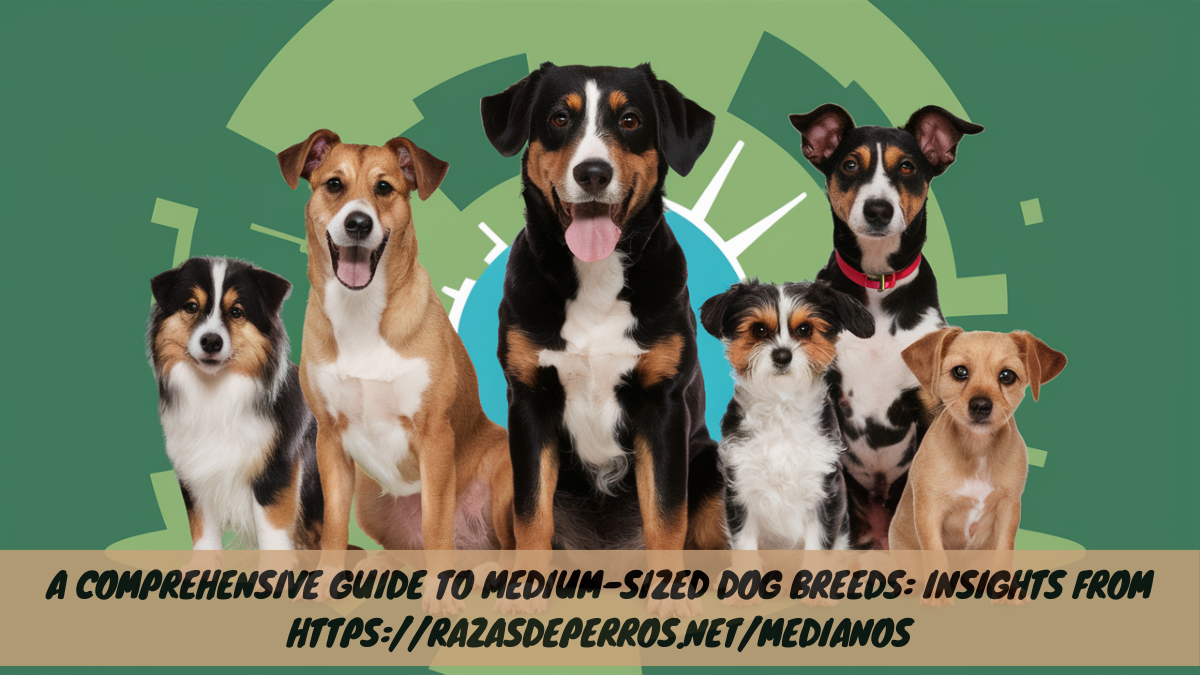A Comprehensive Guide to Medium-Sized Dog Breeds: Insights from Https://razasdeperros.net/medianos
In this extensive guide, we will explore the world of medium-sized dog breeds, with a focus on information available at Https://razasdeperros.net/medianos.
Explore Https://razasdeperros.net/medianos for comprehensive information on medium-sized dog breeds. Discover detailed insights, characteristics, and care tips to choose the perfect medium-sized dog for your family.
This article aims to provide a detailed, humanized, and SEO-optimized resource that surpasses existing online sources. We will delve into various aspects of medium-sized dogs, offering interpretations, analyses, and insights that go beyond what’s already available.
What Are Medium-Sized Dog Breeds?
Medium-sized dog breeds are those that fall between the small and large categories, typically weighing between 25 to 65 pounds. They offer a balance of agility, strength, and companionship, making them popular choices for families and individuals alike. These dogs are versatile and can adapt to various living situations, from apartments to large homes with yards.
Why Choose Medium-Sized Dogs?
Choosing a medium-sized dog can be an excellent decision for many reasons:
- Adaptability: Medium-sized dogs are often more adaptable to different living environments compared to larger breeds. They can thrive in both apartments and houses with yards.
- Manageability: They strike a balance between the high energy of smaller dogs and the more demanding exercise needs of larger breeds.
- Companionship: Medium-sized dogs often have the perfect mix of playfulness and calmness, making them great companions for families with children and other pets.
Popular Medium-Sized Dog Breeds
Here are some of the most popular medium-sized dog breeds, each with unique traits and characteristics:
1. Beagle
- Size: 20-30 pounds
- Temperament: Friendly, curious, and energetic
- Exercise Needs: Moderate; enjoys regular walks and playtime
- Ideal For: Families with children, active individuals
Beagles are known for their strong sense of smell and tracking ability, making them excellent family pets and companions. Their friendly nature and moderate size make them ideal for a variety of living situations.
2. Cocker Spaniel
- Size: 20-30 pounds
- Temperament: Gentle, affectionate, and playful
- Exercise Needs: Moderate; enjoys daily walks and playtime
- Ideal For: Families, individuals seeking a loving companion
Cocker Spaniels are renowned for their beautiful coats and sweet disposition. They are great family pets and are particularly known for their affectionate nature.
3. Bulldog
- Size: 40-50 pounds
- Temperament: Calm, courageous, and loyal
- Exercise Needs: Low to moderate; enjoys short walks and playtime
- Ideal For: Apartment living, families, and individuals seeking a low-energy companion
Bulldogs are recognized for their distinctive appearance and gentle demeanor. Despite their gruff exterior, they are known to be very affectionate with their families.
4. Australian Cattle Dog
- Size: 35-50 pounds
- Temperament: Intelligent, energetic, and loyal
- Exercise Needs: High; requires regular exercise and mental stimulation
- Ideal For: Active individuals, families with outdoor space
Australian Cattle Dogs are highly energetic and intelligent, making them well-suited for active families and individuals who can provide them with plenty of exercise and mental challenges.
5. Shiba Inu
- Size: 17-23 pounds
- Temperament: Independent, alert, and loyal
- Exercise Needs: Moderate; enjoys regular walks and playtime
- Ideal For: Active individuals, families, and those who appreciate an independent dog
Shiba Inus are known for their spirited personality and fox-like appearance. They are independent dogs but form strong bonds with their families.
Choosing the Right Medium-Sized Dog for Your Family
Selecting the right medium-sized dog involves considering various factors to ensure a good match between the dog’s needs and your lifestyle:
- Activity Level: Some medium-sized breeds have high energy levels and need regular exercise, while others are more laid-back. Match the dog’s activity level with your own lifestyle.
- Space: Consider your living environment. While many medium-sized dogs adapt well to apartment living, others may need more space to roam and play.
- Allergies: If you or someone in your household has allergies, look for breeds known for being hypoallergenic or less likely to trigger allergic reactions.
- Children and Other Pets: Ensure the breed you choose is compatible with children and other pets in your household. Some dogs are more tolerant and adaptable than others.
Medium-Sized Dogs and Training
Training is crucial for medium-sized dogs, as it helps them integrate well into family life and ensures they are well-behaved. Here are some tips:
- Start Early: Begin training your dog as early as possible. Puppies are more receptive to learning, and early training helps establish good behavior patterns.
- Positive Reinforcement: Use positive reinforcement techniques, such as treats and praise, to encourage good behavior. Avoid harsh punishment, as it can be counterproductive.
- Consistency: Be consistent with commands and routines. Consistency helps dogs understand what is expected of them and reinforces good behavior.
Health Considerations for Medium-Sized Dogs
Medium-sized dogs generally have fewer health issues than larger breeds, but they are still prone to certain conditions:
- Hip Dysplasia: A common condition where the hip joint doesn’t fit into the hip socket properly. Regular vet check-ups can help catch this early.
- Obesity: Medium-sized dogs are at risk of obesity if not properly exercised or fed a balanced diet. Monitor their weight and adjust their diet as needed.
- Dental Health: Regular dental care is essential to prevent dental issues, such as tartar buildup and gum disease.
FAQs
1. What is the average lifespan of medium-sized dogs?
The average lifespan of medium-sized dogs is typically between 10 to 15 years, depending on breed, genetics, and overall health.
2. Are medium-sized dogs good with children?
Many medium-sized dogs are great with children, but it’s important to choose a breed known for its good temperament and to supervise interactions between dogs and young children.
3. How much exercise do medium-sized dogs need?
Exercise needs vary by breed, but most medium-sized dogs require at least 30 to 60 minutes of physical activity daily, including walks and playtime.
4. Do medium-sized dogs shed a lot?
Shedding levels vary by breed. Some medium-sized dogs shed minimally, while others may shed more frequently. Regular grooming can help manage shedding.
5. What are the grooming needs of medium-sized dogs?
Grooming needs depend on the breed. Some medium-sized dogs require regular brushing and professional grooming, while others need less maintenance.
Conclusion
In conclusion, medium-sized dogs offer a wonderful balance of size, energy, and companionship. By understanding the characteristics and needs of various breeds, you can make an informed decision and find the perfect medium-sized dog for your family. For more information, visit Https://razasdeperros.net/medianos.







